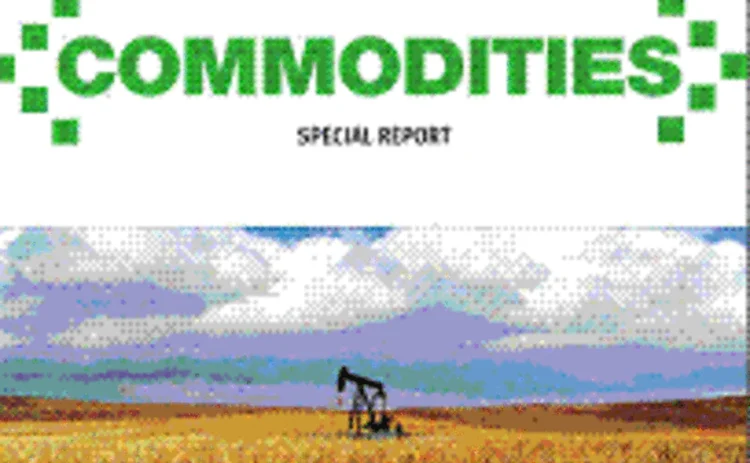Commodities special report

Click here to download the PDF
The Wind of Change... Is Also Data
The commodities markets are in a state of flux. But unlike the changes that have impacted many other asset classes over the past couple of years, commodities are booming, producing a surge in demand for market data on everything from oil and coal to base and precious metals, and crops and livestock, and attracting interest from not just the major commodities trading firms and brokerages, but other speculative traders, hedgers managing risk against related instruments, and even mainstream investors via commodity funds and exchange-traded funds.
But in addition to the usual types of market data required for trading other asset classes-quotes, trades, terms and conditions, maturities, historical information, research, fundamental data, and charting and analytics-commodities also have a range of additional information that must be collected, ranging from crop growth, Department of Agriculture reports, supply and demand data, metrics on the output of individual mines, and weather. And while price data is broadly available from vendors and brokers, more specialized data is frequently the preserve of niche suppliers.
Not only must this data be consolidated together to be useful; it must also be consolidated with other, related information to meet the demands of cross-asset trading strategies as firms arbitrage commodities against each other, or even against other asset classes-trading physical coal or oil against stock in mining or petrochemical companies, for example.
And as these data demands grow, firms will be forced to deal with the same issues that have already been addressed in other asset classes, such as the need for robust data infrastructures that consolidate fragmented sources of increasing volumes of data, and the efficiency arguments of utilizing real-time datafeeds in the back-office as well as on trading desks, to reduce the risk of error from manual processing.
Meanwhile, the Commodity Futures Trading Commission is deciding on setting limits around the level of positions traders can hold in energy and metals futures. Not only does this leave traders uncertain of whether their holdings are compliant or not with the upcoming rules, but also places a burden on the CFTC to collect its own data for the purposes of real-time monitoring of industry positions.
If commodities weren't complicated enough, they're about to reach the next level, and traders and data providers will all need to respond.
Click here to download the PDF
Only users who have a paid subscription or are part of a corporate subscription are able to print or copy content.
To access these options, along with all other subscription benefits, please contact info@waterstechnology.com or view our subscription options here: https://subscriptions.waterstechnology.com/subscribe
You are currently unable to print this content. Please contact info@waterstechnology.com to find out more.
You are currently unable to copy this content. Please contact info@waterstechnology.com to find out more.
Copyright Infopro Digital Limited. All rights reserved.
As outlined in our terms and conditions, https://www.infopro-digital.com/terms-and-conditions/subscriptions/ (point 2.4), printing is limited to a single copy.
If you would like to purchase additional rights please email info@waterstechnology.com
Copyright Infopro Digital Limited. All rights reserved.
You may share this content using our article tools. As outlined in our terms and conditions, https://www.infopro-digital.com/terms-and-conditions/subscriptions/ (clause 2.4), an Authorised User may only make one copy of the materials for their own personal use. You must also comply with the restrictions in clause 2.5.
If you would like to purchase additional rights please email info@waterstechnology.com
More on Data Management
Knowledge graphs, data quality, and reuse form Bloomberg’s AI strategy
Since 2023, Bloomberg has unveiled its internal LLM, BloombergGPT, and added an array of AI-powered tools to the terminal. As banks and asset managers explore generative and agentic AI, what lessons can be learned from a massive tech and data provider?
ICE launches Polymarket tool, Broadridge buys CQG, and more
The Waters Cooler: Deutsche Börse acquires remaining stake in ISS Stoxx, Etrading bids for EU derivatives tape, Lofthouse is out at ASX, and more in this week’s news roundup.
Fidelity expands open-source ambitions as attitudes and key players shift
Waters Wrap: Fidelity Investments is deepening its partnership with Finos, which Anthony says hints at wider changes in the world of tech development.
Data standardization key to unlocking AI’s full potential in private markets
As private markets continue to grow, fund managers are increasingly turning to AI to improve efficiency and free up time for higher-value work. Yet fragmented data remains a major obstacle.
Digital employees have BNY talking a new language
Julie Gerdeman, head of BNY’s data and analytics team, explains how the bank’s new operating model allows for quicker AI experimentation and development.
Can mastering data solve AI’s cognitive dissonance?
The IMD Wrap: Bank execs are still bullish on AI, but recent studies suggest it’s not the panacea they’re making it out to be. Can the two views be rectified?
Everything you need to know about market data in overnight equities trading
As overnight trading continues to capture attention, a growing number of data providers are taking in market data from alternative trading systems.
AI strategies could be pulling money into the data office
Benchmarking: As firms formalize AI strategies, some data offices are gaining attention and budget.








